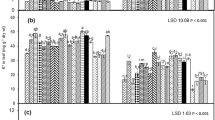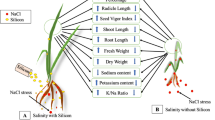Abstract
Salt stress is a main factor limiting the production and productivity of wheat in arid and semi-arid zones. The objectives of this study were to compare the salt tolerance of a selected bread wheat (Triticum aestivum L.) genotype, ‘Bohoot 210’ and Libyan local variety ‘Krassie’ and to evaluate the effect of plant growth regulators and nutritional elements on emergence and seedling growth at the germination stage under salt stress conditions. Sterilized seeds were soaked in the priming solutions for 12 h at room temperature, air-dried, and placed in Petri dishes for germination with four levels of seawater salinity (0% = 0 mS/cm (S1), and seawater salinity at 0.75% = 13.053 mS/cm (S2), 1.5% = 24.695 mS/cm (S3), and 3% = 46.253 mS/cm (S4)). Six moderators (Control, Kinetin: 80 ppm, Gibberellic acid GA3: 50 ppm, Auxin: 7 ppm, Iron: 50 µmol/L Fe-EDTA, and Potassium Nitrate: 150 mg/L) were used to test the behavior of two bread wheat varieties submitted to salt stress. Germination rate, coleoptile and radicle weight, the number of radicles, and coleoptile and radicle length were measured at the germination stage. The results revealed that salt stress significantly reduced plant growth at an early stage in both varieties. Moreover, the application of three plant growth regulators and two nutrients improved all parameters and the effect differed significantly with the applied moderator, variety, and salinity level. Iron treatment was the best priming treatment and improved the germination rate, the roots weight, length and number, and coleoptiles length under salt stress. The autochthonous bread wheat variety, Krassie, was more tolerant to salt stress than the selected variety Bohoot 210.








Similar content being viewed by others
References
Abis S (2012) Wheat in the Mediterranean region: societies, trade and strategies. IEMed, Barcelone
Afzali I, Basra S, Farouk M, Nawaz A (2006) Alleviation of salinity stress in spring wheat by hormonal priming with ABA, salicylic acid and ascorbic acid. Int J Agric Biol 8:23–28
Akram M, Ashraf M, Ahmad R et al (2010) Screening for salt tolerance in maize (Zea mays L.) hybridsat an early seedling stage. Pak J Bot 42:141–154
Al-Idrissi M, Sbeita A, Jebriel A, et al (1996) Libya: Country Report to the FAO International Technical Conference on Plant Genetic Resources. In: The FAO International Technical Conference on Plant Genetic Resources. Leipzig, Germany, pp 1–28
Asswad RME (1995) Agricultural prospects and water resources in Libya. Ambio 24:324–327
Curtis B, Rajaram S, Gómez Macpherson H (2002) Bread wheat—improvement and production. http://www.fao.org/3/y4011e00.htm. Accessed 12 March 2020
DLCC (2018) Business Opportunities Report for Dutch companies Libya—Agriculture sector. Netherlands Enterprise Agency
El Messallati N (2007) An analytical study of the contribution of the agricultural sector in Libyan GDP. Department of Agricultural Economics University of Omar Al-Mukhtar, Arabic Book Publishers, Libya
Elfagehia A (2014) An overview of grains and feed market in Libya. 1–19
FAO (2016) FAO GIEWS Country Brief on Libya
Farooq M, Usman M, Nadeem F et al (2019) Seed priming in field crops: potential benefits, adoption and challenges. Crop Pasture Sci 70:731–771. https://doi.org/10.1071/CP18604
Fuller MP, Hamza JH, Rihan HZ, Al-Issawi M (2012) Germination of primed seed under NaCl stress in wheat. ISRN Bot 2012:e167804. https://doi.org/10.5402/2012/167804
Gurmani AR, Khan SU, Ali A et al (2018) Salicylic acid and kinetin mediated stimulation of salt tolerance in cucumber (Cucumis sativus L.) genotypes varying in salinity tolerance. Hortic Environ Biotechnol 59:461–471. https://doi.org/10.1007/s13580-018-0056-5
Hakim MA, Juraimi AS, Hanafi MM et al (2014) The effect of salinity on growth, ion accumulation and yield of rice varieties. J Anim Plant Sci 24:874–885
Iqbal M, Ashraf M (2013) Gibberellic acid mediated induction of salt tolerance in wheat plants: growth, ionic partitioning, photosynthesis, yield and hormonal homeostasis. Environ Exp Bot 86:76–85. https://doi.org/10.1016/j.envexpbot.2010.06.002
Jovovic M, Tunguz V, Mirosavljević M, Przulj N (2018) Effect of salinity and drought stress on germination and early seedlings growth of bread wheat (Triticum aestivum L.). Genetika 50:285–298. https://doi.org/10.2298/GENSR1801285J
Kalyani V, Ghanatethinam J (1984) Effect of seed treatments on field emergencea earge growth and some physiological processes of sunflower (Heliantus annuus L.). Field Crop Res 5:46–52
Kempton RA, Fox PN, Cerezo M (eds) (1997) Statistical methods for plant variety evaluation. Springer, Netherlands
Khan A, Shafi M, Bakht J, Anwar S (2017) Effect of salinity and seed priming on growth characters of wheat varieties. Sarhad J Agric 33:435–446. https://doi.org/10.17582/journal.sja/2017/33.3.435.446
Maqsood T, Akhtar J, Farooq M et al (2008) Biochemical attributes of salt tolerant and salt sensitive maize culti-vars to salinity and potassium nutrition. Pak J Agric Sci 45:1–5
Marschner H (2012) Mineral nutrition of higher plants, 3rd edn. Elsevier, Amsterdam
Matthews S (1980) Controlled deterioration: a new vigour test for crop seeds In: Hebblethwaite PD. Seed production. Butterworths, London
Mavİ K (2014) Use of extract from dry marigold (Tagetes spp.) flowers to prime eggplant (Solanum melongena L.) seeds. Acta Sci Pol Hortorum Cultus 13:3–12
Mirshekari B (2014) Effect of seed priming with microelements on germination speed, seedling vigor and flower yield of marigold (Calendula officinalis L.)
Radi AA, Farghaly FA, Hamada AM (2013) Physiological and biochemical responses of salt-tolerant and salt-sensitive wheat and bean cultivars to salinity. https://www.semanticscholar.org/paper/Physiological-and-biochemical-responses-of-and-and-Radi-Farghaly/e28018a4654ff4de36b66bc2df203479099e5757. Accessed 2 April 2020
Rajabi Dehnavi A, Zahedi M, Ludwiczak A et al (2020) Effect of salinity on seed germination and seedling development of sorghum (Sorghum bicolor (L.) Moench) genotypes. Agronomy 10:859. https://doi.org/10.3390/agronomy10060859
Rhaman MS, Imran S, Rauf F et al (2021) Seed priming with phytohormones: an effective approach for the mitigation of abiotic stress. Plants 10:1–17. https://doi.org/10.3390/plants10010037
Richards DE, King KE, Ait-Ali T, Harberd NP (2001) How gibberellin regulates plant growth and development: a molecular genetic analysis of gibberellin signaling. Annu Rev Plant Physiol Plant Mol Biol 52:67–88. https://doi.org/10.1146/annurev.arplant.52.1.67
Romdhane L, Radhouane L, Farooq M et al (2020) Morphological and biochemical changes in maize under drought and salinity stresses in a semi-arid environment. Plant Biosyst Int J Deal Asp Plant Biol 154:396–404. https://doi.org/10.1080/11263504.2019.1635221
Roohi R, Jameson DA (1991) The effect of hormone, dehulling and seedbed treatments on germination and adventitious root formation in blue grama. Rangel Ecol Manag 44:237–241. https://doi.org/10.2307/4002949
Rout G, Sahoo S (2014) Screening of iron toxicity in rice genotypes on the basis of morphological, physiological and biochemical analysis. J Exp Biol Agric Sci 2:568–582
Salah SM, Yajing G, Dongdong C et al (2015) Seed priming with polyethylene glycol regulating the physiological and molecular mechanism in rice (Oryza sativa L.) under nano-ZnO stress. Sci Rep 5:14278. https://doi.org/10.1038/srep14278
Santner A, Estelle M (2010) The ubiquitin-proteasome system regulates plant hormone signaling. Plant J Cell Mol Biol 61:1029–1040. https://doi.org/10.1111/j.1365-313X.2010.04112.x
Shahverdi MA, Omidi H, Tabatabaei SJ (2017) Effect of nutri-priming on germination indices and physiological characteristics of stevia seedling under salinity stress. J Seed Sci 39:353–362. https://doi.org/10.1590/2317-1545v39n4172539
Singh H, Jassal RK, Kang JS et al (2015) Seed priming techniques in field crops—a review. Agric Rev 36:251–264. https://doi.org/10.18805/ag.v36i4.6662
Sneideris LC, Gavassi MA, Campos ML et al (2015) Effects of hormonal priming on seed germination of pigeon pea under cadmium stress. An Acad Bras Cienc 87:1847–1852. https://doi.org/10.1590/0001-3765201520140332
Suo J, Zhao Q, David L et al (2017) Salinity response in chloroplasts: insights from gene characterization. Int J Mol Sci 18:1011. https://doi.org/10.3390/ijms18051011
Tuna AL, Kaya C, Dikilitas M, Higgs D (2008) The combined effects of gibberellic acid and salinity on some antioxidant enzyme activities, plant growth parameters and nutritional status in maize plants. Environ Exp Bot 62:1–9. https://doi.org/10.1016/j.envexpbot.2007.06.007
Yamaguchi S (2008) Gibberellin metabolism and its regulation. Annu Rev Plant Biol 59:225–251. https://doi.org/10.1146/annurev.arplant.59.032607.092804
Zhang X, Zhang D, Sun W, Wang T (2019) The adaptive mechanism of plants to iron deficiency via iron uptake, transport, and homeostasis. Int J Mol Sci 20:2424. https://doi.org/10.3390/ijms20102424
Zocchi G, De Nisi P, Dell’Orto M et al (2007) Iron deficiency differently affects metabolic responses in soybean roots. J Exp Bot 58:993–1000. https://doi.org/10.1093/jxb/erl259
Acknowledgements
This work was supported by the Plant Physiology Laboratory of the National Institute of Agronomic Research, Carthage University, Tunisia and the Biology Department, College of Science, Elmergib University, Khoms, Lybia.
Author information
Authors and Affiliations
Contributions
EH: Investigation and funding acquisition. AS: Writing—review & editing. LRo: Formal analysis. HCM: statistics analysis. MASF: Resources. LRa: Supervision.
Corresponding author
Ethics declarations
Conflict of interest
The authors declare that there is no conflict of interest.
Additional information
Handling Editor: Ranjit Riar.
Publisher's Note
Springer Nature remains neutral with regard to jurisdictional claims in published maps and institutional affiliations.
Rights and permissions
About this article
Cite this article
Hadia, E., Slama, A., Romdhane, L. et al. Seed Priming of Bread Wheat Varieties with Growth Regulators and Nutrients Improves Salt Stress Tolerance Particularly for the Local Genotype. J Plant Growth Regul 42, 304–318 (2023). https://doi.org/10.1007/s00344-021-10548-3
Received:
Accepted:
Published:
Issue Date:
DOI: https://doi.org/10.1007/s00344-021-10548-3




